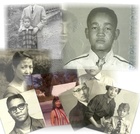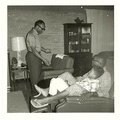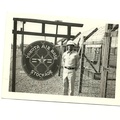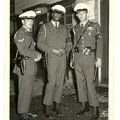Read “Part 2: Waters [1 of 2]” >>
The Waters (continued)
Denver, Colorado 1982
“Hey Boy!…Yeah, You. I’m talking to you Boy!”1
“Yes, officer,” I say to the policeman who had just called out to me at 11:00 at night as I walked home from volleyball practice at the YMCA. The flashlight is shone onto my face as I turned to face him. He sees I’m in a blue warm-up suit with my Onitsuka Tiger (now called Asics) sports bag. There are two of them. They violently push me over to the police car and tell me to put my hands up. They are laughing.
“What are you doing out here?”
“I’m coming home from volleyball practice.”
“Don’t you have a car? Let’s see your ID.”
They search me with their hands. They violently turn me to face them.
“You got drugs?”
“No, I don’t do drugs.”
“Yeah, that’s what you all say,” and they both laugh.
One is a white guy, the other who seems Latino. Both about my height.
They tell me to open my mouth, they have to touch inside my crotch to feel for packages.
“Can’t you see you just J-walked?”
“J-walked? It’s almost midnight and there aren’t any cars anywhere, not one.”
“Don’t smart-mouth us, Boy!”
They ticket me for J-walking. I curse them. They threaten me with arrest.
“You better shut up boy!”
When I told my friend earlier that day about the same kind of police moment that happened the previous week, they told me I should’ve kept my mouth shut.
“Why? Do you know how many times I’ve been humiliated by them?”
“Just forget it Fred.”
“Shut the f*** up. I wish you could go through it just once, then multiply it five thousand times and then let’s hear what you say.”
I only understood my blackness through Japanese eyes in the 1950s and ‘60s, when my body represented Japan’s intense relationship with its former enemy, with westernization and self-displacements and feelings of inferiority, and the often normalized ways in which unified identities structure the darker as “other” in its view of lighter as superior. I knew nothing, in those times, of U.S. Black history and didn’t even know what “Amerika” was. My experiences of anti-black racism after moving to the U.S. seemed to be a continuation of my experiences in Japan, not yet thought out or understood. Nevertheless, it was pain and struggling with subjugating, violent forces. It also brought brave and kind friends to sometimes ally with us, and help us in various ways. Others, of course, were oblivious.
When I was in my 20s—in Colorado, Chicago, New York, or Los Angeles, police talking down to me became something normal—without me having to have committed an act (other than being born). I had been told by Dad, and others, that I should learn to just “swallow my dignity,” be “good” and quiet, don’t get into trouble. But I possessed no dignity to those police. Or shall I say that dignity was there for them to feel pleasure in crushing. It is their continuing and allowed sadism that enlivens subjugation. It was my problem. Others just watched like it was a sideshow, a movie, or perhaps inwardly glad. Or perhaps more privileged and protected people understood in an individualized way, that it was my own individual battle to fight—none of their business. It was the way it was, at least for me. And between admonishments to “stop my crying and complaining” and “quit being a baby” and “be strong” and “don’t cry,” I question. I think. What to do. What to do. But there have been friends who stepped up to challenge bullies and defended. I will never forget them.
Time goes on.
Assimilating us.
Mama and I spoke on the telephone earlier today, March 2010.
She wondered:
Mama no jinsei nan no riyū ga arundarou?
I wonder what reason my life has?
I responded:
Mmm…Furetto mo tokidoki onaji koto o kangaeru no yo, jibun no koto…
Yeah…(I don’t know). I sometimes think the same question about myself…
Now I lie in the dark.
Staring. Thinking.
* * * * * * *
I love the water. I feel comfortable in water. I love being around water.
When I took my first swim lessons at the base swimming pool on Tachikawa US Air Force Base in Japan, the nice-looking white-American man who taught our class how to swim, marveled to my parents how quickly I learned to swim, how natural it was, almost without instruction.
I love oceans. And hot baths—especially the Japanese kind—ofuro. And long hot showers in the U.S. and in Turkey too. Waterfalls can hypnotize me and soothe. And whenever I get the chance to go with friends to the mountains to go camping, I try to insist on putting up our tents near a lake or pond or stream. When I lived in Colorado in the ‘80s, when I was in my mid-20s, I loved to go camping with friends and sit by waterfalls as long as I could.
In my hometown in Japan in the 1950s, the sewage canals were everywhere, in the open. The American military kids called them “benjo ditches.” Benjo is the old and crude Japanese word for toilet. Water, no matter how nice or stinky, was always heard. Sometimes the stench, I remember, was wow! Really really bad. Water, brown and dark, ran dirty all through the town.
And then there was the stream where Mama and I used to go wash our clothes in that was near the house. There were no washers and dryers in our neighborhood back then. It was 1950s Japan. Mama and I used to carry the baskets of our clothes for about what I remember to be a twenty to thirty minute walk to the creek just outside our cluster of wooden houses. I was about three years old or four, so the baskets were heavy. Mama would carry one handle and I’d carry the other. Still it was heavy and huge for my little body. When we reached the creek, we’d pull out the wooden washboard and the bars of soap. Mama and I would sing and laugh and scrub the clothes on the washboard, scrubbing the dirt away from the cloth while the soap suds soaked. Back and forth, back and forth. Rhythm. I loved those moments with Mama. The water was all around and soaked us. Mama rolled up her slacks or her western-style skirt so they wouldn’t get wet. The sound of the water running over the rocks and down to somewhere we couldn’t see, was a joyful experience. I felt everything was just perfect.
But I’ve almost drowned three times throughout my life. First when I was a four-year old, playing with my toy truck—aTonka truck shipped to me by a Dad I didn’t know who lived in some far away place called “Amerika.” One day when I played near the creek Mama told me not to go near. I ran my truck over this small tiny little swinging wooden bridge that ran across the canal by our house, I concentrated so hard on making the truck noises and ignoring Mama, I fell thirty or forty feet into the canal off the bridge. I remember being so tired, so tired. I kept screaming “Tasukete!!!” “Tasukete!!!” but it seemed no one could hear me. Then I realized that the water level started at my waist level, but was now just below my lower lip. I didn’t panic. I thought: how am I supposed to die now? Should I just let myself drink the water? Should I hold my breath until I can’t? What’s going to happen?
I was a strange child. I was going to die that day in complete calm. Perhaps I was calm because I knew it was water. Water. Mama was so angry with me when, later some Japanese fieldworkers working to build the U.S. base, rescued me from that drowning, hoisting me up to ground level with a rope, leading me home to the house I led them to. When Mama opened the door and the men told them what had happened, she yelled at me—how stupid and disobeying I was. Then she dumped a bucket of cold water on me and locked me out of the house for awhile. I shivered and cried, but I thought and knew it was all my fault.
And there was the time I was almost washed away by the ocean when I was eleven years old at Camp Erdman in Hawaii, a summer camp that Dad enrolled me in. I loved those two summers I attended. The camp was awesome and Larry Romento and Scott Wood and some other friends wanted me to join with them while they body-surfed the big waves. I remember that day that later, after I had almost drowned, the beach was closed. The waves were about twenty feet high. Fun, danger, flowing, pulsing.
The year I was born, Japan openly acknowledged that it was the beginning of the “new” Japan, consumerism and all. The political system was called “The 1955 system” or set-up. It was a one-and-a-half political party system that unified conservative power in postwar Japan. At the same time, it was the year that consumer products intensified their intrusion and expansion into Japanese life. So I came to love watching television so intensely and I still do. It comforts me. It is my friend. It was new and exciting.
The Ginza and Shinjuku were packed with people and neon lights and the fragrance of thousand restaurants and noodle shops and sounds. It was life. People rode bicycles, walked, and more and more scooters were around. Sometimes a person pulled or rode a horse-drawn carriage—although I saw less and less as the years went on before we moved to America. I watched television and listened to music to block-out…
war-baby, yellow-baby, red-baby, tar-baby.
War-bride, dragon lady, whore, yellow, negro, nigger, half-breed, mutt,
oriental, Jap, insect, monster, ching-chong china, gook, chink, whore,
sissy, mama’s boy, traitor, boy, ainoko, kurombo, konketsuji, b*tch,
un-american, non-japanese.
WHAT (thing) ARE YOU?
How can anyone tell these memory-stories without betraying the past?2
Notes:
1. The term “boy” was the name used as a condescending term for slave or animal during the days of slavery and post-slavery in the United States. No Black person enjoyed being called this name since the legal slavery days in the U.S. However, this practice continues through today. When my father used to be mad at me, he used the term “boy” to call me. Right away, I knew its signification and meaning.
2. Questions posed by many writers, but I take this dilemma as an immediate consequence of page 27 in Cathy Caruth’s work—Unclaimed Experience: Trauma, Narrative, and History.
This is an anthropology of memory, a journal and memoir, a work of creative non-fiction. It combines memories from recall, conversations with parents and other relations, friends, journal entries, dream journals and critical analysis.
To learn more about this memoir, read the series description.
© 2011 Fredrick Douglas Cloyd






